A 5 minute Christmas Homily
Dear Friends, the Christmas homily ought to be short! The meaning of the day is made abundantly clear in the carols sung, the readings proclaimed, the liturgy prayed, and the festivities in the home. The homilist need only add an exclamation point to what the Christmas liturgy shouts out with joy, that the beloved son of God was born of Mary! Here’s my Five-Minute Christmas Homily for 2022.

Robert: Merry Christmas, everyone. [Robert sings.] It’s beginning to look a lot like Christmas, everywhere you go. People are going to pray. They’re listening every day, to stories from the Bible all aglow.
Oh…wait a minute. Wrong words…how does the song go? (sing with me if you know it):
It’s beginning to look a lot like Christmas, everywhere you go. Take a look at the five and ten, it’s glistening once again with candy canes and silver lanes aglow. It’s beginning to look a lot like Christmas, toys in every store. But the prettiest sight to see is the holly that will be on your own front door.
Wow. The writer of that Christmas song sure got it wrong. Sure, candy canes and silver lanes aglow are fun, and buying toys in every store keeps the economy going but, are these the real signs of Christmas? Everybody, shout, “NO!”
All: NO!
Robert: We just need to look to the beautiful people in the Christmas story for the true signs that indicate Christmas is here. But I need your help in this Gospel reflection. When I raise my hand, would you shout out, “It’s beginning to look like Christmas!” Let’s practice. [Robert raises his hand.]
All: IT’S BEGINNING TO LOOK A LOT LIKE CHRISTMAS!
Robert: When you and I, like Mary, open our hearts to the love of God, when we say, “Yes!” to following his will for our lives, then…[ Robert raises his hand.]
All: IT’S BEGINNING TO LOOK A LOT LIKE CHRISTMAS!
Robert: When you and I, like Joseph, have the courage to stand up for what is right and protect the innocent, from babies to migrants to caring for our beautiful earth, then… [Robert raises his hand.]
All: IT’S BEGINNING TO LOOK A LOT LIKE CHRISTMAS!
Robert: When you and I who are struggling in marriage and family, love one another like Mary and Joseph, forgive each other any hurt we may have caused, and work to restore friendship and affection, then…
All: IT’S BEGINNING TO LOOK A LOT LIKE CHRISTMAS!
Robert: When you and I, like the Magi, can discern when the political powers are trying to manipulate us, and we do not play their games but instead listen to the Holy Spirit speaking to our hearts, thereby thwarting their evil machinations, then… [Robert raises his hand.]
All: IT’S BEGINNING TO LOOK A LOT LIKE CHRISTMAS!
Robert: And when you and I, like the angels in the sky, gather for worship, lift our voices to heaven to sing glory to God in the highest, listen to the Word of God, and receive the Eucharist, then… [Robert raises his hand.]
All: IT’S BEGINNING TO LOOK A LOT LIKE CHRISTMAS!
Robert: And lastly, when we make room in the “inn of our hearts” and walk with the shepherds of the world, with those hard-working laborers, with families who struggle to make ends meet; when we accompany them to Bethlehem to be with the Christ Child and Mary and Joseph, where there is neither rich nor poor, slave nor free, woman nor man, but we are all one in Christ, then… [ Robert raises his hand.]
All: IT’S BEGINNING TO LOOK A LOT LIKE CHRISTMAS!
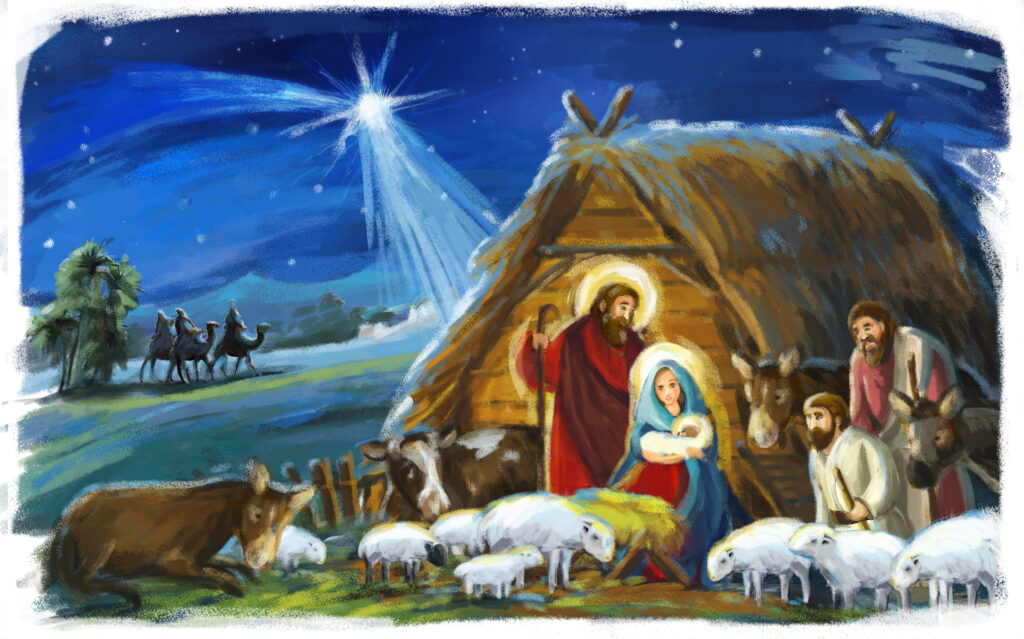
Robert: Decorations are nice; gifts are wonderful to give and receive. But it’s truly Christmas when our joy, celebrations and sharing of gifts spring from the profound knowledge that we are deeply loved by God through the gift of Jesus and we share that love with all we meet. Knowing this, we can live Christmas every day of the year. So, friends, let’s show the world what Christmas really looks like! Because when we do, all people will know that… [Robert raises his hand.]
All: IT’S BEGINNING TO LOOK A LOT LIKE CHRISTMAS!
An Advent Meditation by Mother Teresa
(Given at the first World Youth Jubilee in Rome, 1983)
Who do you say I am? (Matthew 16:15)

You are God. You are God from God. You are begotten, not made. You are One in Substance with the Father. You are the Son of the living God. You are the Second Person of the Blessed Trinity. You are One with the Father. You are in the Father from the beginning. All things were made by you and the Father. You are the Beloved Son in whom the Father is well pleased. You are the Son of Mary, conceived by the Holy Spirit in the womb of Mary.
You were born in Bethlehem. You were wrapped in swaddling clothes by Mary and put in the manger full of straw. You were kept warm by the breath of the donkey who carried your Mother with you in her womb. You are the Son of Joseph, the carpenter as known by the people of Nazareth. You are an ordinary man without much learning as judged by the learned people of Israel.
Who is Jesus to me?
Jesus is the Word made Flesh. Jesus is the Bread of Life. Jesus is the Victim offered for our sins on the Cross. Jesus is the Sacrifice offered at the Holy Mass for the sins of the world and mine.
Jesus is the Word — to be spoken.
Jesus is the Truth — to be told.
Jesus is the Light — to be lit.
Jesus is the Life — to be lived.
Jesus is the Love — to be loved.
Jesus is the Joy — to be shared.
Jesus is the Peace — to be given.
Jesus is the Bread of Life — to be eaten.
Jesus is the Hungry — to be fed.
Jesus is the Thirsty — to be satiated.
Jesus is the Naked — to be clothed.
Jesus is the Homeless — to be taken in.
Jesus is the Sick — to be healed.
Jesus is the Lonely — to be loved.
Jesus is the Unwanted — to be wanted.
Jesus is the Leper — to wash his wounds.
Jesus is the Beggar — to give him a smile.
Jesus is the Drunkard — to listen to him.
Jesus is the Mentally Ill — to protect him.
Jesus is the Little One — to embrace him.
Jesus is the Blind — to lead him.
Jesus is the Dumb — to speak to him.
Jesus is the Crippled — to walk with him.
Jesus is the Drug Addict — to befriend him.
Jesus is the Prostitute — to remove her from danger and befriend her.
Jesus is the Prisoner — to be visited.
Jesus is the Old — to be served.
To me
Jesus is my God. Jesus is my Spouse. Jesus is my Life. Jesus is my All in All. Jesus is my Everything. Jesus, I love You with my whole heart, with my whole being. I have given Him all, even my sins and He has espoused me to Himself in tenderness and love.
Now and for life I am the Spouse of my Crucified. Spouse. Amen.
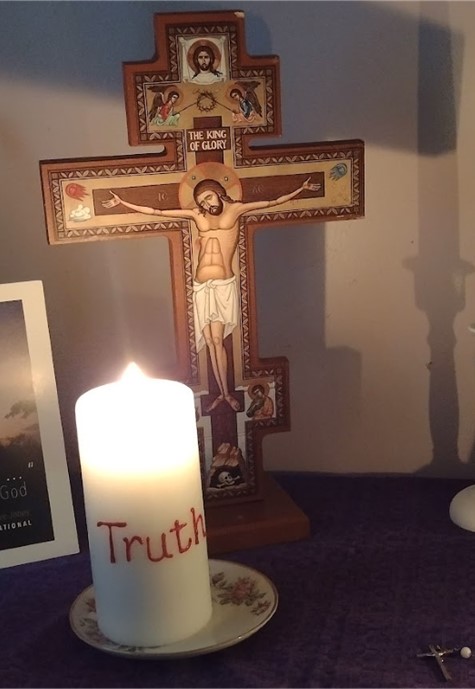
Is it Rocky vs Apollo Creed, David vs Goliath? No it’s…
By Robert Fontana

Yes, ladies and gentleman, the battle of the century is upon us (as it is every year). In one corner, dressed in red, sporting a white beard, wearing a night cap, and holding a sign that reads “Shop at Macy’s,” is COMMERCIAL CLAUS, or as popularly known, SANTA.

In the other corner, wearing a priestly stole, also sporting a white beard, and carrying gifts for the poor in one hand and the shepherds staff in the other, is St. Nicholas!
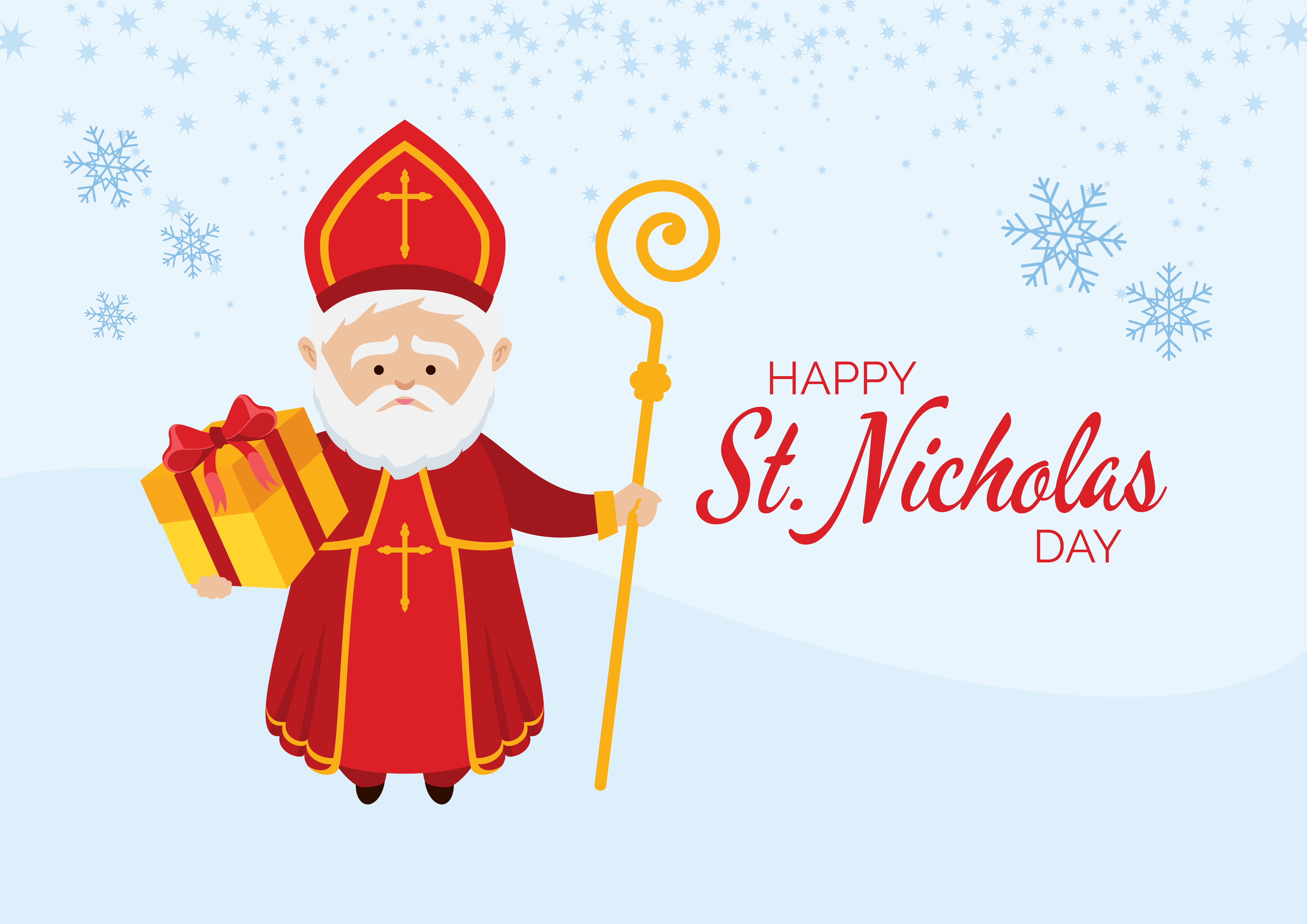
LET THE RUMBLE BEGIN! It is being fought in your heart and mine. Commercial Claus is backed by the trillion dollar commercial interests from Amazon to Walmart. St. Nicholas is backed by Jesus, the carpenter from Galilee, Francis and Clare from Assisi, disciples of Jesus today, and all men and women of good will who want children to know that they are loved for who they are and not for what they possess.
December 6 is the Feast of St. Nicholas, Bishop of Myra (in modern day Turkey). He had a reputation for secretly giving gifts to people in need, which led to the rise among pious Christians of the figure of Santa Claus (Sinterklaas (Dutch: [ˌsɪntərˈklaːs]) or Sint-Nicolaas – https://en.wikipedia.org/wiki/Saint_Nicholas). Sadly, as we all know, the commercial interest of secular culture have co-opted Santa Claus for its own purpose and few people know of the saintly figure behind the secular Santa (which, ironically, means “Holy.”).
Lori and I decided when our children were small to make the Feast of St. Nicholas a special day for them so that they would understand the Christian figure behind the Santa Claus story. We are continuing that custom with the grandchildren. On St. Nicholas Day morning, they will be opening their Christmas stockings, each containing a book, a candy treat, and an orange. (Here’s a you tube link for the story of St. Nicholas for children: https://www.youtube.com/watch?v=gfsGFHbCPCM)
Here’s a reflection on the difference between St. Nicholas and Santa Claus, followed by a prayer service that families (with or without children) or friends can do to honor St. Nicholas, disciple of Jesus, and friend of the poor.
- Santa wants your credit card; Nicholas wants your heart.
- Santa will turn you into a consumer; Nicholas will help you be a servant.
- Santa is a whimsical tale of a fat old elf who gives toys to boys and girls who have been good; St. Nicholas helped children escape from poverty and slavery.
- Santa reminds us to give presents; Nicholas reminds us to give ourselves.
- Santa is controlled by the department store; Nicholas was led by the Spirit.
- Santa is a man dressed in a costume; Nicholas was a Bishop who cared for his people.
- Santa reminds us to follow the Christmas sales; Nicholas reminds us to follow Jesus.
- Santa promises us happiness through gift-giving; Nicholas reminds us that happiness is the fruit of a faithful life.
- Santa is a fun story to read to children at Christmas Eve; Nicholas was a man of great compassion who sold his possessions and gave the money to the poor so that he could do God’s will in perfect freedom.
- Santa has nothing to do with Jesus the God-Man whose birth is celebrated on Christmas Day. Nicholas’ life only makes sense because of his love and commitment to Jesus the God-Man whose birth is celebrated on Christmas Day.
A Prayer Service for the Feast of St. Nicholas, Adapted by Robert Fontana from a prayer service by Thomas G. Simons from the St. Nicholas Center.
Call To Worship
Leader: Praise God for St. Nicholas!
Children: Yea St. Nicholas!
Leader: The Spirit of the Lord was upon him.
Children: Yea St. Nicholas!
Leader: Loving God, St. Nicholas loved Jesus, and because he loved Jesus he loved children and the poor. We honor his memory today and in doing so hope to imitate his kindness and love.
Children: St. Nicholas, pray for us. Amen!
Word Service – 1 Peter 5.1–4
The following summary of the life of St. Nicholas may be read and discussed.
St. Nicholas was born to Christian parents. Legends recount the story of Nicholas’ baptism when his parents brought him to the sacred fount; he leapt from his mother’s arms into the Baptismal waters. After the death of his parents, he gave away his inheritance to the poor of Myra, and dedicated himself to serve his people first as a priest and later as a bishop.
Bishop Nicholas preached the Gospel in a Roman culture still dominated by Greek and Roman religious customs and moral behavior. He organized Churched, taught the Catholic faith, and invited non-Christians to join the community of faith. He is most remembered as a helper to the poor and to children. Once Bishop Nicholas heard that a father was struggling to feed his three daughters. He did not have the money for a marriage dowry, and was considering selling them off into slavery so they would at least have something to eat. On three occasions, Bishop Nicholas threw a bag of gold through the window into the room of the sleeping father. His daughters soon were married. Later the father came to Nicholas, fell at his feet and said, “Nicholas, you are my helper.”
This story and his many other works of charity led to the tradition of giving presents on the Feast of St. Nicholas and at Christmas. The name Santa Claus, in fact, evolved from his name.
Bishop Nicholas proclaimed the Gospel, baptized new Christians, feed the hungry and poor, and taught the truths of Christianity. He died at Myra in 350 A.D. His popularity, already great, increased when his bones were brought to Italy in 1087. Both the Eastern and Western churches honor him. St. Nicholas is the patron saint of Russia, Greece, and Sicily. He is regarded as the special patron of children. His feast is day is December 6.
Advent & the Year of Jubilee begin December 1
By Robert Fontana
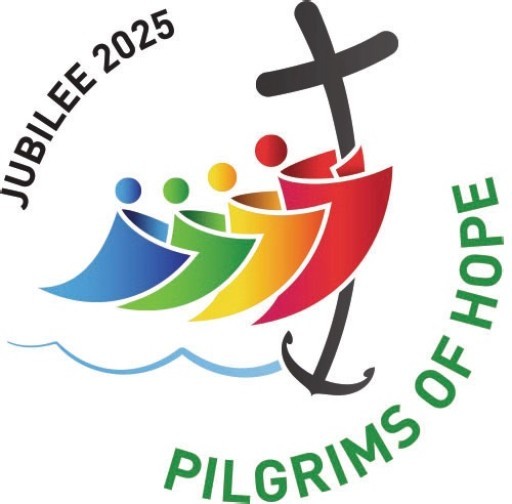
You may have missed this from the Vatican with all the fuss over the American elections in the news, but 2025 has been declared a YEAR OF JUBILEE! The custom of declaring a Jubilee Year dates back to Pope Boniface VIII in the 13th century. Boniface was not known for his holiness. Although he did not use the word “Jubilee,” he invited European Christians to journey to Rome to the place where Peter and Paul were martyred – the journey was praying on their feet, for the forgiveness of sin.
The biblical reference for a Jubilee year is Leviticus 25:10: “You shall proclaim liberty in the land for all its inhabitants. It shall be a jubilee for you, when each of you shall return to your own property, each of you to your own family.”
Jubilee 2025 begins on December 1, the first Sunday of Advent. Pope Francis writes,

“We must fan the flame of hope that has been given us, and help everyone to gain new strength and certainty by looking to the future with an open spirit, a trusting heart and far-sighted vision. The forthcoming Jubilee can contribute greatly to restoring a climate of hope and trust as a prelude to the renewal and rebirth that we so urgently desire; that is why I have chosen as the motto of the Jubilee, Pilgrims of Hope. This will indeed be the case if we are capable of recovering a sense of universal fraternity and refuse to turn a blind eye to the tragedy of rampant poverty that prevents millions of men, women, young people and children from living in a manner worthy of our human dignity.
Here I think in particular of the many refugees forced to abandon their native lands. May the voices of the poor be heard throughout this time of preparation for the Jubilee, which is meant to restore access to the fruits of the earth to everyone.
As the Bible teaches, “The sabbath of the land shall provide food for you, for yourself and for your male and female slaves and for your hired servant and the sojourner who lives with you; for your cattle also, and for the beasts that are in your land, all its yield shall be for food,” (Lev 25:6 – 7)
The spiritual dimension of the Jubilee, which calls for conversion, should also embrace these fundamental aspects of our life in society as part of a coherent whole. In the realization that all of us are pilgrims on this earth, which the Lord has charged us to till and keep (cf. Gen 2:15), may we never fail, in the course of our sojourn, to contemplate the beauty of creation and care for our common home. It is my hope that the coming Jubilee Year will be celebrated and experienced with this intention too. Growing numbers of men and women, including many young people and children, have come to realize that care for creation is an essential expression of our faith in God and our obedience to his will. (https://www.iubilaeum2025.va/en/giubileo-2025/lettera-di-papa-francesco.html)
We “Pilgrims of Hope” are being invited to pray on our feet! Pope Francis is inviting us to leave our homes and, if possible, go to Rome to pray at the tombs of the great saints Peter and Paul. And if you can’t go to Rome, go to a shrine of your choosing closer to you. Consider, especially, the diocesan Cathedral. (Lori and I are pictured below walking on the pilgrimage route to the great cathedral of Santiago, Spain.)

He invites us to leave our homes quite aware of the traumas afflicting our world. He writes about becoming pilgrims of hope without turning a “blind eye” to the millions of people suffering from intense poverty, refugees fleeing their homelands, and even the earth which is also suffering from the degradation of human exploitation. We go on pilgrimage to be transformed, to step away from what has been our normal way of doing things, and to place ourselves on a path to hear the Gospel anew. We will meet new people, have new prayer and liturgical experiences, and feel the soreness of our feet as we walk, perhaps a great distance like the 500 miles of the Camino de Santiago, or perhaps only 500 feet from the tour bus to St. Peter’s or your local cathedral or shrine.
In whatever manner we step out in pilgrimage during this Year of Jubilee, the purpose is to conform our lives more closely to the life of Jesus so that we can return home better prepared to evangelize, to share the good news of God’s love, in word and deed. Evangelization is not a “four-letter” word! Catholics resist it because we are terrified God is going to ask us to go door-to-door like the Mormons or Jehovah Witnesses or stand on the street corner like an evangelical preacher. Here’s what St. Peter says in the letter that bears his name (1 Peter 3:15 – 16):
…sanctify Christ as Lord in your hearts. Always be ready to give an explanation to anyone who asks you for a reason for your hope, but do it with gentleness and reverence…
Lori and I did a pilgrimage walk from Florence to Assisi to reflect upon the lives of saints Francis and Clare, to be inspired by their example in following Jesus. It brought us closer to each other and closer to God. It has born fruit in deepening our commitment to help migrants at the border. This Advent we will be welcoming our first migrant family from El Paso at our newly forming parish Welcome Circle. May you find the pilgrimage path that will draw you closer to God and deepen your commitment to evangelize in word and deed.
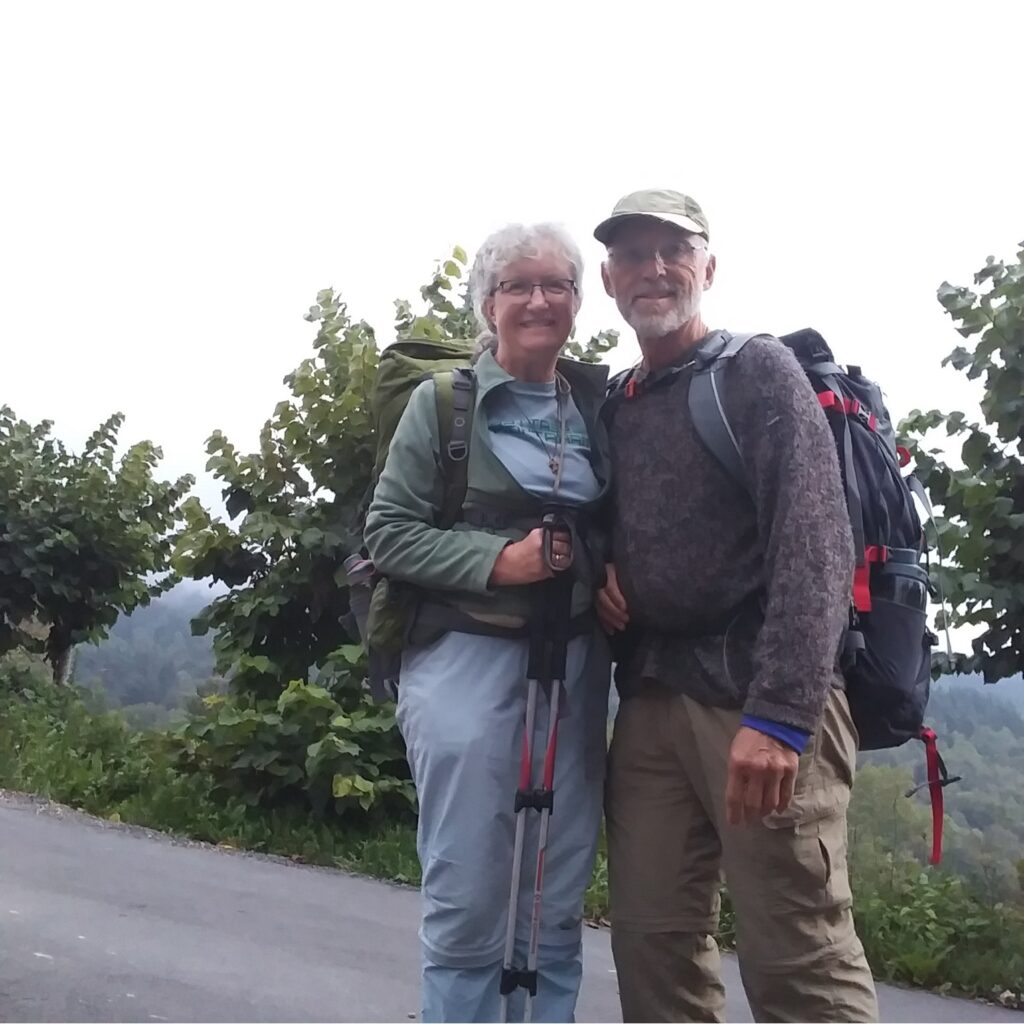
Becoming the perfect Church…Ha! Ha! Ha! There’s no such thing, but…
By Robert Fontana
When I was young (and dumb) and beginning my life in ministry, I was filled with zeal as a Catholic and disciple of Jesus. Zeal led me to do apostolic work at a parish which served a Navajo reservation in New Mexico, and then to the seminary to see if God was calling me to be a priest. After deciding “No” to that question, I joined a Catholic household of students at LSU, hoping to capture the idealism and lifestyle of the first followers of Jesus.

I seemed to be driven by some vague notion that there was a much better way of being church than what my parents’ generation had modeled for me. There must be a way to perfectly imitate Jesus and the saints by willingly renouncing worldly possessions and living in community among the poor and spiritually abandoned. Lori and I were so captivated by this idea that we, with three small children, moved with other families to a poor neighborhood in south Louisiana to create the perfect church.
Guess what happened?
WE FAILED MISERABLY! We argued endlessly over the rules of community life, could never agree on how to integrate children into such a project, rarely shared in fun, and never learned how to resolve conflict. We tried to create the perfect structure for being the perfect disciples of Jesus without first getting to know one another, discovering how different we were from each other, and learning how to simply get along.
That failure taught us a lot – mostly not what to do. But also it opened my eyes to the illusion of trying to be the “perfect church” because there is no such thing. It did not exist when Jesus was walking with his disciples – they continued to argue about which one was the greatest; and one of them ended up betraying Jesus.
The perfect church did not exist following the giving of the Spirit at Pentecost – the widows of the Greek-speaking members were being left out of the distribution of food and services, and there were intense arguments over how to welcome non-Jews into the community.
The perfect church did not happen during early church history: in the fourth century, after Christianity was legalized, there was basically a civil war between Christians who followed Arius and those who were Orthodox or Catholic. Arius was condemned at the Council of Nicea but that did not prevent violence from breaking out between the two sides.

So, if we cannot work to build the perfect church, can we work to build the church to which the Holy Spirit is guiding us? This is the focus of our upcoming retreat scheduled for Saturday, October 26th, with Fr. Dennis Berry, ST, and Sr. Debra Wilson, MSBT (information below).
Perhaps this goal, the church desired by the Holy Spirit, is as elusive as seeking the perfect church. Indeed, how can we discern how the Holy Spirit is guiding God’s people in this particular time of history? This is not an easy task for a church that is global, is situated in a multitude of different languages and cultures, and is rocked by its own internal divisions caused by the clergy sex abuse crisis and tensions between traditionalists, moderates, and progressives.
As we prepare for this retreat, we are mindful of four dimensions of Catholic life that we hold together as we discern how to become the church that the Holy Spirit wants:
1. the New Testament witness of the life and teachings of Jesus and his first followers;
2. the example of the saints;
3. the theology and pastoral direction of the 2nd Vatican Council;
4. the leadership of Pope Francis.

We invite everyone to participate in our retreat weekend, but for those who cannot attend in person, let me ask you the following:
When you consider the tensions within the church and society today, which stories from the life of Jesus and which of his teachings and those of the New Testament writers resonate with you, and why?
When you consider the tensions within the church and society, which examples of the saints resonate with you, and why?
When you consider the tensions within the church and society today, what teachings and pastoral directions of the 2nd Vatican Council (as you understand them) resonate with you, and why?
When you consider the tensions within the church and society today, what from the leadership of Pope Francis resonates with you, and why?
You might take some time for your own retreat and reflect on these questions. I would love to have you write your responses to me (send to Robert@catholiclifeministries.org).
__________________________________________________
If you live in the Pacific Northwest, please join us for this day of prayer and study with two very outstanding presenters. You will not regret the time spent meeting new people, renewing old friendships, praying, learning, sharing in small groups, and concluding with the celebration of the Eucharist.
Place: Assumption Catholic Church, 6201 33rd Ave NE, Seattle, WA 98115. We will conclude with the vigil Mass!
Cost: $30 (single), $50 (couple) Scholarships available.
Please bring your own brown bag lunch. Snacks/drinks will be provided. To register: Email: Robert@catholiclifeministries.org that you wish to participate, and pay the fee at catholiclifeministries.org/donate/ OR bring a check to the retreat, payable to CLM.
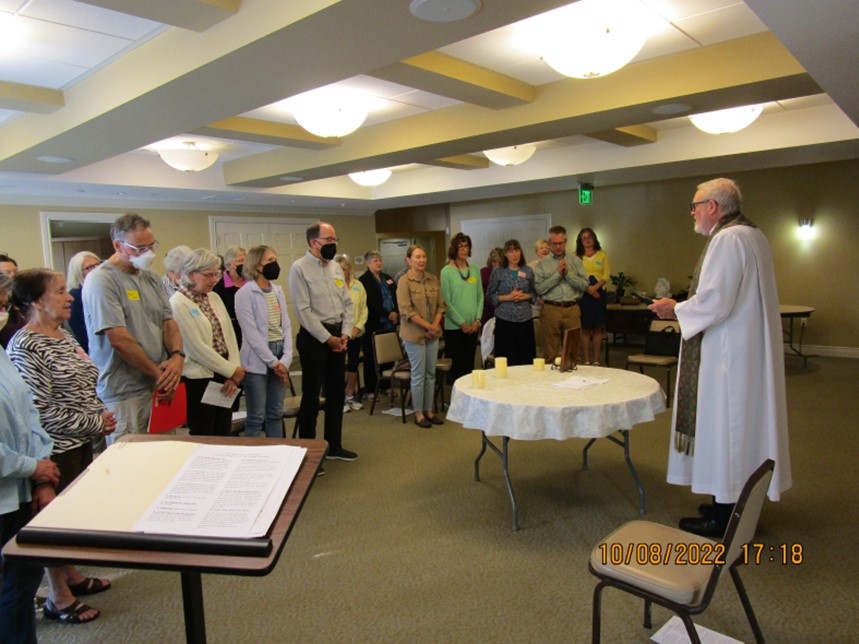
Christian Marriage is Beautiful…and Hard
By Robert Fontana
Christian marriage is beautiful, wonderful, amazing, and awesome because marriage, when done right, brings about what St. Paul calls the fruits of the Spirit: love, joy, peace, patience, kindness, goodness, faithfulness, gentleness, and self-control. (Gal 5:22-23) And this is true, of course, for secular marriages as well. I have a bias towards marriage as a Catholic who accepts the Catholic worldview on marriage: a life-long covenant, freely entered, that welcomes children.
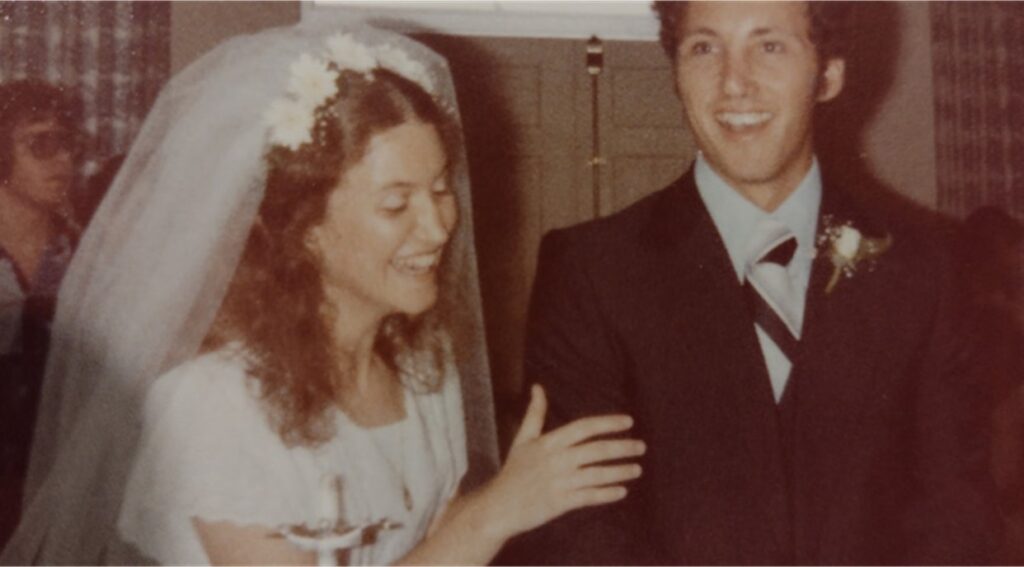
But the social research supports what Catholics and other people of faith believe about marriage. Basically, IT’S A GREAT INSTITUTION that needs to be valued, protected, and supported because successful marriages contribute so much good to society. In her book The Case for Marriage (© 2000), University of Chicago sociologist Linda Waite and co-author Maggie Gallagher document evidence from social research around the country regarding the state of marriage in America. What they discovered was that people who are married are happier, wealthier, healthier, have children who are more likely to succeed, and have better sex lives than their fellow American who were co-habiting or single (never married, divorced, or widowed). Yes, contrary to the jokes and the Hollywood image of swinging singles, married people report sex lives which have almost the same frequency as their co-habiting counterparts, more frequency than their single counterparts, and more enjoyable and meaningful than both groups!
Some might say, well Rob, that research is old. Maybe things have changed. We increasingly live in a post-marriage culture. Young people are moving in together and remaining unmarried in greater numbers. They are not having children; instead they get dogs. What does the research say about marriage in the post-pandemic America of today?

Good question. Because Brad Wilcox, professor of sociology and director of the National Marriage Project at the University of Virginia, has completed research on the state of marriage in America… and guess what he found out? The conclusions that Waite and Gallagher wrote in 2000 hold up today in 2024. Wilcox concludes in his book, Get Married, that Americans must, in fact, “save civilization” by embracing marriage and forging strong families!
THERE ARE NO LOSERS WHEN MARRIAGE SUCCEEDS! Everybody wins! In fact, contrary to popular myth, the biggest winners in successful marriages are MEN!! Marriage isn’t a ball and chain holding men down. Marriage is what most men need to mature and become their best selves.
Certainly, women and children thrive when marriage succeeds, but the evidence shows that men especially do. Married men enjoy more physical and mental health, live longer, and report happier and more meaningful lives than their single male counterparts. Single men, as they age, suffer more episodes of depression, struggle with isolation, turn more often to alcohol, drugs, porn, and watching sports to cope, and die younger than their married counterparts.
Christian marriage adds a special purpose to marriage that both enriches married love and spreads its goodness. Christian marriage is all about Jesus and his mission on earth, to announce the good news of the Kingdom of God. Jesus described the Kingdom of God as a “treasure” discovered in a field and a “pearl of great price” for which one is to sell everything to purchase. (Mt 13:44-46)
The “Kingdom of God” is nothing less than the Holy Spirit fully alive and active in creation: working for love to overcome hate, hope to conquer despair, and faith to be victorious over sin and suffering. The Kingdom of God is vast and present in creation and among all people who sincerely seek God and strive to be guided by love. It is most visible in the life, death, and resurrection of Jesus.
Jesus proclaimed the Kingdom of God not simply to get you and me to heaven but to bring heaven to earth. Indeed, he taught us to pray that “thy kingdom come; thy will be done on earth as it is in heaven.”
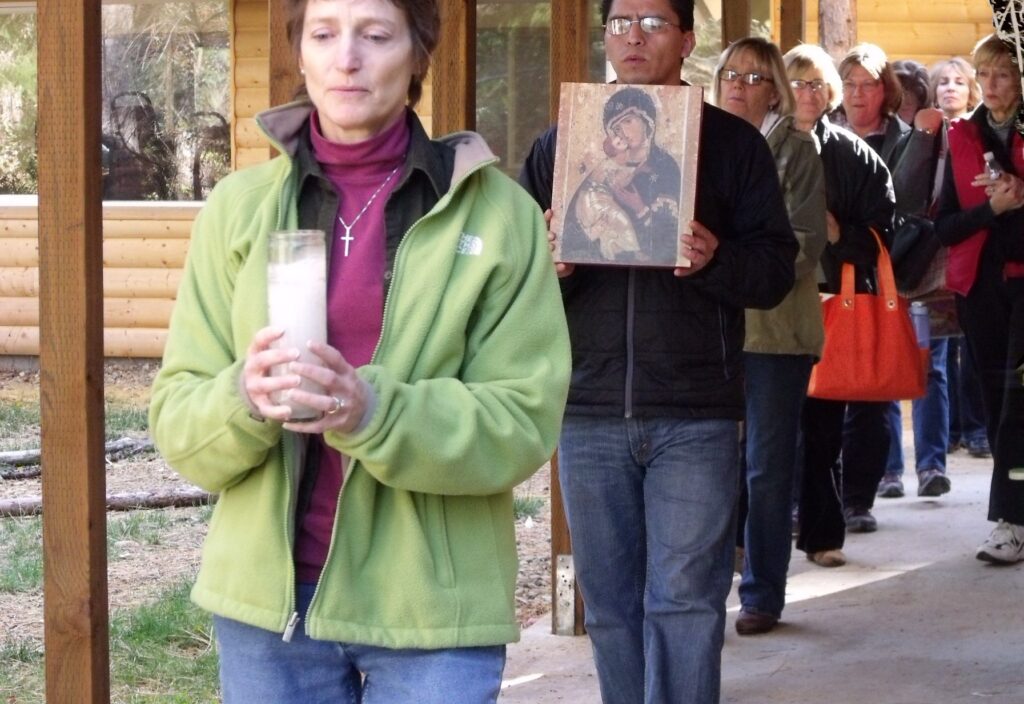
Christian marriage, as a sacrament of the Church, is a building block for the Kingdom of God on earth. It is a visible and tangible institution that God uses to build strong individuals, families, neighborhoods, schools — the foundation for a good and just society. It is a visible sign of God’s love for humanity and all creation (Ephesians 5:21-33). This doesn’t mean that Christian marriages are problem-free. In fact, Christian marriages have all the problems that every marriage has when two people who are very different from one another try to love one another and their children within the challenges and complexities of everyday life. And it is in the very process of spouses’ working at loving and forgiving one another as disciples of Jesus that God’s kingdom unfolds. It is truly a “treasure hidden in a field.” This is how Lori describes it:
I’m convinced that my marriage, too, is that hidden treasure alluded to in Scripture. My marriage in Christ, a sacrament of life and love, is worth whatever sacrifice is necessary to make it work. It takes all the faith, hope, and love that Jesus has given me to love and serve my spouse and family. Marriage comes at a great cost – EVERYTHING! The happily-ever-after scenario from the fairy tales is just that; a fairy tale, unless both spouses are willing to risk everything – their egos, independence, self-centeredness, personal hopes and dreams, etc. – to become one in Christ. Thankfully, we have a lifetime to do this because it does take a lifetime for couples to love one another, grow in friendship and trust, work together as a team especially as parents, and forgive one another.
Marriage is the hidden treasure. It demands of us every ounce of energy, every skill at communicating, and every reserve within our hearts to live up to the promise we made in our marriage vows: “to love, to be true, and to honor.”
What is the “hidden treasure” that could be worth such a sacrificial way of life? Peace! In John’s Gospel (14:27, 16:33) we read, “Peace I leave with you; my peace I give to you. Not as the world gives do I give it to you…I have told you this that you might have peace in me…”
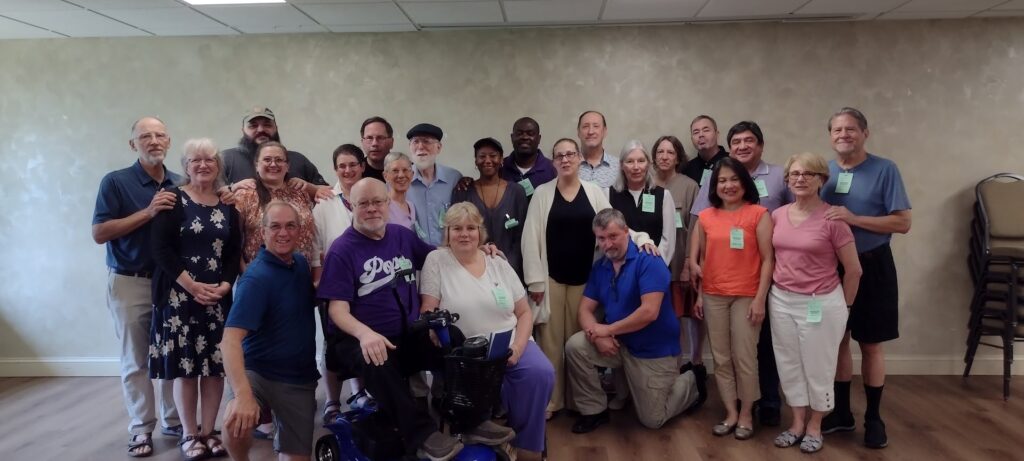
Christian marriage is beautiful. When done right, when we create a pattern of working together as Lori described above, we gain a taste of heaven as described by Paul. We gain the fruits of the Spirit: love, joy, peace, patience, kindness, goodness, faithfulness, gentleness and self-control. (Gal 5:22-23)
(Next article, Christian Marriage is Beautiful…and Hard, Part II.)
1933 Nazi Germany, the National German Church and 2024 USA, Christian Nationalism
by Robert Fontana
Something terrible happened in 1933 Germany. The previous year the Nazi party won enough local elections to become one of the dominant political parties in Germany, with enough political clout to warrant the naming of Adolph Hitler as chancellor of Germany. Hindenburg, the German president, did not want to name Hitler chancellor. He feared Hitler’s aggressive and intimidating tactics. But the old president was persuaded by advisors that Hitler would be restrained by wise counselors. They were wrong. Hitler was not to be restrained. He quickly seized power and made Germany a one-party state.
As terrible as that was, that is not the event I am referring to. No, the event I am referring to is the absorption of 28 regional Protestant Churches into the National Reich Church which fully supported the Nazis and their policies. Pro-Nazi German Christians wanted a “nazified version of Christianity.” Their leader, Ludwig Müller, was a rabid Nazi and antisemite who was named the first bishop of the National German Church. [1]
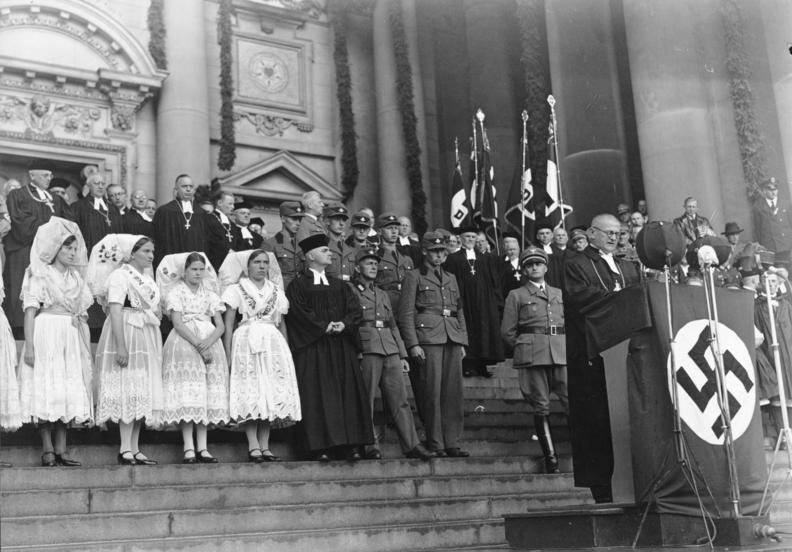
Initially the only Christian group who opposed the Nazis and the German National Church were evangelical Lutherans led by Martin Niemöller and Dietrich Bonhoeffer. Niemöller and Bonhoeffer demanded that the church of Christ centered on the Word of God not be co-opted and replaced by the state. This was idolatry of the worst kind. They formed the Confessing Church in opposition to the Protestant National German Church and the Nazi regime, knowing full well of the opposition to come.[2]
The Vatican initially tried to work with the Hitler regime. On July 20, 1933, the Vatican signed an agreement with the German foreign minister which recognized Hitler’s role as chancellor, giving him international legitimacy. With this agreement the Vatican withdrew support for the Catholic political party that had been challenging the National Socialists/Nazis. In return, the Nazi government gave the Catholic Church freedom without government interference to exercise its mission of churches and schools in Germany. This, of course, was a commitment that Hitler did not keep. As Hitler increased the use of violence against his political enemies and enacted antisemitic laws and harassment of Jews, he also pressured Catholic leaders to remain silent.[3]
The Pope refused to be silent. On March 10, 1937, Pope Pius XI issued an encyclical (Mit brennender Sorge/With Deep Anxiety) condemning the Nazi regime’s violation of the 1933 agreement and the neopaganism and worship of the state that had replaced true religion in Germany. Pius defended the dignity of the human person which must be protected by the state: “man as a person possesses rights he holds from God, and which any collectivity must protect against denial, suppression or neglect.” Pius did not explicitly name Hitler and the Nazi regime his encyclical, but he did make a reference to a “mad prophet” leading the people. Mit brennender Sorge was written in German and not Latin. Fearing Nazi censorship, the Vatican smuggled 300,000 copies into Germany. The encyclical was read from the pulpit of every Catholic church on Palm Sunday, March 21, 1937. Hitler was outraged. The next day the Gestapo, the German secret police, raided Catholic churches across Germany to confiscate copies.[4]
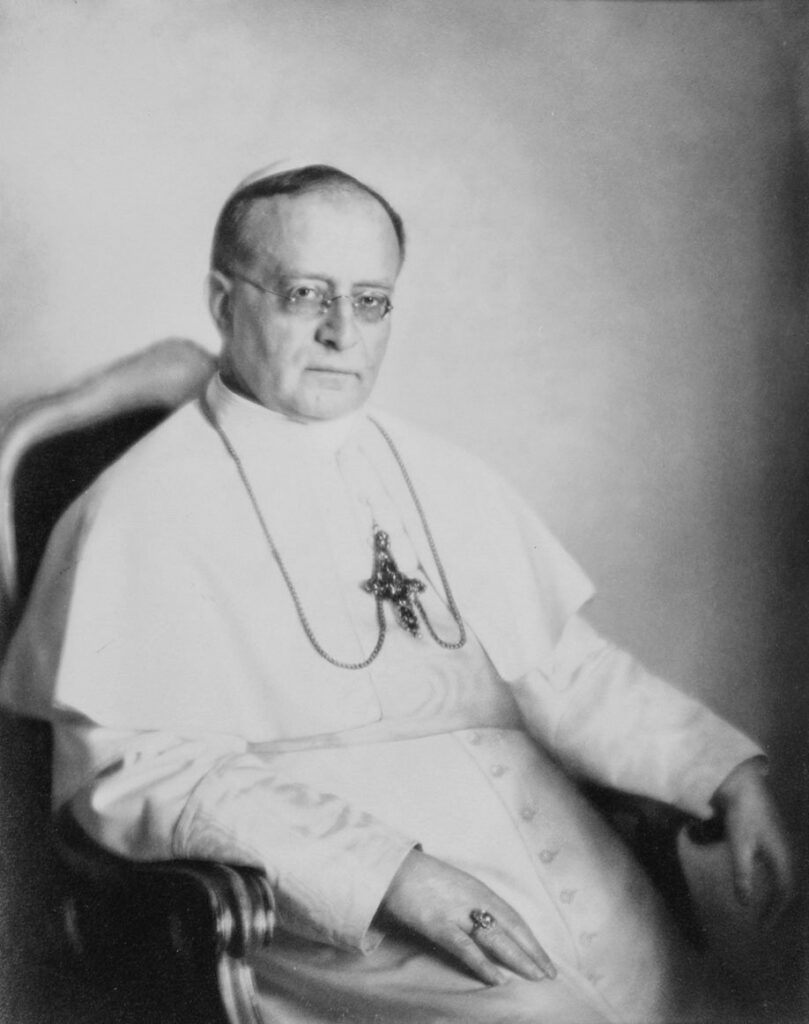
As Germany edged closer to war in Europe, all opposition to the Nazis, both Protestant and Catholic, was crushed. The Confessing Church was closed, its seminarians conscripted into the army, and its leaders arrested. Catholic schools and religious institutions were closed, and Catholic leaders, clergy and lay, who spoke out against the Nazis were also arrested.
I see disturbing similarities between the Germany of the 1930’s and the United States in 2024. There is a new fascism in the US led by the former president that has broad support from evangelical Christians. Much like German evangelicals who supported Hitler without question, Christian nationalist support Donald Trump without question. They see Donald Trump as God’s instrument to return the U.S. to its Christian foundation and conservative values.[5]

Christian Nationalists are supporting Trump despite the following:
- Trump has refused to accept the results of the 2020 election and has repeatedly lied to the American public that the election was fraudulent and stolen (even though Trump’s own attorney general told Trump the election was free from fraud.
- Trump was willing to use violence to overturn the 2020 election. He invited supporters, including violent extremists like the Proud Boys and Oath Keepers, to assemble at the Capitol on January 6 and pressure the Republican congressional delegates and Vice-President Pence to reject the results of the electoral college. (JD Vance stated that had he been Pence, he would have rejected the certification of the electoral college vote giving Biden the win in the 2020 election.)[6]
- The Justice Department indicted former President Trump on four felony counts for his efforts to overturn the 2020 presidential election.[7]
- A Fulton County, Georgia, grand jury indicted former President Trump and 18 others including his chief of staff Mark Meadows for unlawful efforts to change the outcome of the 2020 election in that state.[8]
- A Manhattan federal jury found former President Trump guilty of sexually assaulting E. Jean Carroll in a dressing room in a luxury department store.[9]
- Another Manhattan federal jury found the former president guilty of 34 counts of falsifying business records. This trial featured hush money Trump paid to a porn star, Stormy Daniels, to keep her from going public about their sexual encounter before the 2016 election.
Christian Nationalists proudly proclaim, “Jesus is my savior, Trump is my president.” They see Trump as God’s instrument to “Make America Godly Again.” They pay little attention to Trump’s lies or immoral and criminal behavior. They support Trump right or wrong and will use violence if necessary to reach their goals.[10]
One thing that was present in 1937 but is missing in 2024 is the voice of Catholic leaders publicly naming the lies and threats of the new fascism and condemning them.
- Where is the Catholic bishop who will declare that sexually assaulting women, lying to the nation, and undermining trust in the democratic process and in the judicial system is a grave sin?
- Where is the Catholic bishop who will declare that attempting to overturn a duly elected president by violence and deceit is a mortal sin?
- Where is the Catholic bishop who has the wisdom and courage of Pope Pius XI to write a pastoral letter to the people of his diocese, to be read at all the Masses, naming the lies and threats of the new fascism and condemning them?
This is not taking a partisan position, Democrats over Republicans. This is about spiritual discernment and reading the “signs of the times” of the very real threat that the Christian Nationalists and former president Donald Trump pose to the constitutional government in United States in 2024.
Having the Pope speak out did not stop the Nazis in 1937, but it was the right thing to do. Having the bishops speak out against the current rise of fascism promoted by the former president and his followers may not stop them either, but it is the right thing to do!
[1] https://encyclopedia.ushmm.org/content/en/article/the-german-churches-and-the-nazi-state
[2] Ibid
[3] www.americanmagazine.org/faith/2003/09/01vatican-concordat-hitlers-reich
[4] https://en.m.wikipedia.org/wiki/Mi_brennender_Sorge
[5] Freedomforum.org
[6] https://www.npr.org/2022/12/23/1145209559/jan-6-committee-final-report#:~:text=After%20roughly%2018%20months%20of%20investigations%2C%20the%20House,Donald%20Trump%20for%20his%20role%20in%20the%20attack.
[7] https://www.pbs.org/newshour/politics/read-full-the-indictment-against-trump-for-his-efforts-to-overturn-the-2020-election
[8] https://www.pbs.org/newshour/politics/read-the-full-georgia-indictment-against-trump-and-18-allies
[9] https://www.cnn.com/politics/live-news/e-jean-carroll-trump-trial-verdict-05-09-23/index.html
[10] https://apnews.com/article/trump-christian-evangelicals-conservatives-2024-election-43f25118c133170c77786daf316821c3
20 years ago I was attacked by a woman with an ice pick (And your invitation to support Catholic Life Ministries!)
By Robert Fontana

There is a saying that “Fools rush in where angels fear to tread.” Lori often quotes that verse to me when I make a suggestion to her like, “Why don’t we go to El Paso and work in the shelter for the summer?” But I digress from the story about being attacked by a woman with an icepick. It’s true.
I was working at the Diocese of Yakima late one fall evening. The sun was beginning to set, I was alone at the office when the phone rang. I answered it, and the woman on the line pleaded desperately for help: “I NEED A PRIEST! I NEED SOMEBODY TO HELP! MY DAUGHTER IS POSSESSED!” I could hear the daughter screaming in the background. Her mother continued, “Can you help? Please! She says she’s in hell. She’s been listening to heavy metal music all day. I don’ know what to do!” I asked the woman if her daughter had been drinking or doing drugs. “Absolutely not!” (Of course, that wasn’t true. She had been drinking heavily.)

I took her address and phone number and vowed to get help. I called a local priest and asked for his assistance. “I WOULDN’T TOUCH THAT WITH A 10-FOOT POLE. CALL MENTAL HEALTH.” I was a little offended by the priest’s response. When someone calls the Church for help, the Church ought to be there for them even though other professionals need to get involved as well. I called the mental health hotline and the dispatcher said he would organize a team to go to the woman’s house, but it would take “an hour or so.” I decided I would go ahead of them and help comfort the mother.
What unfolded can only be described as a scene out of an Alfred Hitchcock movie. The woman and daughter lived in a rural section of Yakima County, at the end of a long gravel road. I stepped out of the car. I kid you not, the wind was blowing, her screen door was slamming open and shut, and a dog howled in the distance. I had the thought, “I might be killed. Maybe this isn’t a good idea.”
I knocked on the door, and the panicked mother let me in, so grateful that I would come to help. “Okay, maybe I won’t die.” She described the events leading up to her daughter current state and led me to the young woman’s room. We entered, and I saw a terrified 17-year-old sitting curled up on her bed with her back against the wall. She was holding a large plastic container of something I assumed was soda.
As I approached her, I had the strong notion to sing Amazing Grace. I was hoping it would be familiar, show to her I was not a threat, and help her to calm down. Her mother was right behind me. I was able to get right up to her when suddenly she leaped at me, brandishing an ice pick in her hand. She slashed and nicked my back. Soda splashed all over me and her and her mom as Mom and I tried frantically to grab the ice pick from her. When I pulled the ice pick away, the girl retreated to her bed, and Mom and I fled to the kitchen.
I called the Mental Health Hotline. “What’s taking you so long?” “We’re on our way.” I told them about the ice pick. The dispatcher said, “Oh, I forgot to tell you to remove all dangerous objects from her room!”
The mental health crisis team eventually arrived, and I handed off the mother and daughter to the professionals. Mom was eternally grateful that I came to her house. It truly helped her calm down. And I learned a valuable lesson. Do not try to do good beyond my expertise. Comforting the mother? I knew what I was doing. Helping the girl? I was out of my league.
Now what does this story have to do with my asking you to pray for and donate to Catholic Life Ministries? We do work that you believe in and can’t do yourself – marriage enrichment and preparation; spiritual development; service days for the elderly and poor; mental health counseling for individuals, couples, and families. We reach out, take risks, learn from our mistakes and strive on to awaken young and old alike to the great love God has for us in Jesus and the Holy Spirit. It doesn’t stop there, we challenge ourselves and those we serve to return God’s love by loving one another, especially those on the margins, the poor and spiritually abandoned.

We also write about the graces and challenges of living as disciples of Jesus within the contemporary world. We do so, not as experts, but as sinners struggling to be saints within the circumstances and events of our daily life. We are not above criticisms and disagreements, and we welcome both, along with your suggestions/comments.
If you are already a sponsor of CLM, we thank you with grateful hearts, and ask you to renew your commitment. If you are not a sponsor of CLM, we ask you to consider becoming one. Our commitment to you is to do effective ministry and to address difficult topics of integrating faith with life. We aim to “think with the Church,” as one spiritual mentor said, and we add, “and help the Church think!”
To Donate to online go to: https://www.catholiclifeministries.org/donate/
To donate by US Post:
Make checks payable to CLM. Mail to:
Catholic Life Ministries, 1827 NE 58th St. #B, Seattle WA 98105

Homespun Homily: Notes from the Border
By Lori Fontana
How bad would it have to be that you would choose to leave your home, your extended family and friends, your country, and perhaps even your children or spouse to travel to a place where you desperately hoped life would be better? How bad?
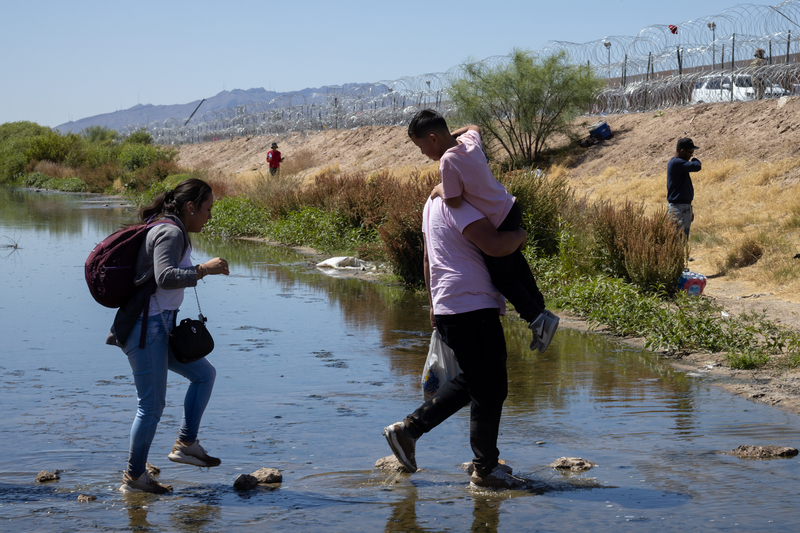
How bad would it have to get for you to choose to travel thousands of miles – not via plane, train, or bus, but crammed in an open train car, or locked in the windowless trailer of a semi, or walking through thick jungle teeming with poisonous snakes and insects, through hostile cities plagued by corrupt police officials, through barren desert, with no relief from the heat, the tiredness, the hunger and thirst?
These are the “travel” stories we’re hearing here at the border. The people we meet are beautiful and brave. They arrive at our shelter having endured trauma, first in their own communities which are unstable, at times to the point of collapse, under the weight of high inflation, few jobs, and high- priced and / or scarce food and necessities.
Many have endured physical deprivation and abuse on their journey. They’ve paid their life savings to hire a “coyote” who promises safe passage, but instead they have been mistreated with verbal and physical violence or even left stranded along the way, without food or water.
Some of our migrant guests have been the target of gang violence. They’ve been threatened, extorted, beaten, stabbed. One person who wouldn’t cooperate with the local gang was thrown into a pond of crocodiles. Gang members have threatened to kidnap or kill their children and other family members.

As I see it, and as our guests tell of their own experiences, it becomes apparent that people migrate to our United States of America for two basic reasons: lack of food / work and threat of violence. And I very much believe that if faced with either of these scenarios, I, too, might risk everything to end up in a place where I could find a job and have enough to eat, where I could send my kids to school and to bed each night without worrying that they might be kidnapped or killed.
Our borders, immigration – it is all very complicated; and yet, it’s simple. Native Americans were the first inhabitants of this land from sea to shining sea. And all of the rest of us are immigrants or come from a line of migrants to this country. Being a U.S. citizen is not the result of anything we’ve done – we were just born here! Many don’t see it this way. Loud voices decry migrants of today – they’re taking our jobs, crowding our schools, packing welfare rolls.
But, please, open your eyes. Look around. On an ordinary day in my hometown, someone delivered my newspaper (I still read one!) to my doorstep; someone cut my hair – both recent migrants. I rode the city bus – the driver was from west Africa; I ate some Thai food – the chefs were from Thailand. I passed a shoeshine stand, a laundromat, a nail salon – each of the proprietors was a recent immigrant. Our doctor is from China and our dentist from Korea.
How many “Help Wanted” signs do you see each day? Restaurants, hospitals, construction companies, schools, tech companies, daycares, retail stores, parks departments, farms and grocery stores – all segments of our economy are begging for workers. Where will they come from?
In 1886, in New York Harbor, the Statue of Liberty was dedicated. Did you learn Lady Liberty’s inscription as a school kid?
Give me your tired, your poor, your huddled masses yearning to breathe free, The wretched refuse of your teeming shore, send these the homeless tempest-tossed to me. I lift my lamp beside the golden door! ~Emma Lazarus

In the 1880’s, the tired and poor coming to our “golden door” were O’Malleys and Salvatores, Bukowskis and Ovrelids (like my grampa from Norway), Schmidts and the English counterpart – Smiths. Today it’s Sanchezes and Aguileras, Fouches and Bekeles, Smirnovs and Wangs. People yearning for, and willing to work for, an opportunity at the “American Dream.”
If the Statue of Liberty doesn’t compel you to reflect on immigration in 2024, I hope you will turn to the words of Jesus:
“For I was hungry and you gave me something to eat, I was thirsty and you gave me something to drink, I was a stranger and you invited me in, I needed clothes and you clothed me, I was sick and you looked after me, I was in prison and you came to visit me.” Matthew 25:35 – 36
It is clear that our immigration system needs work. In the meanwhile, as Christians we are challenged that migrants are “Jesus” at our door. What part am I called to do? I can’t fix the global problems. But I can welcome the stranger at my door and offer a cup of cold water. This is the mission of Annunciation House.
El Paso Journey from Seattle Vs El Paso Journey from Ecuador
By Lori and Robert Fontana
The day before we left Seattle I took a walk through my favorite green space, the Ravenna Ravine. I walked slowly, knowing that Lori and I were going to be living in El Paso, a city in the high desert, close to our southern border which is crowded with buildings and has very few trees. I breathed in the cool air, listened to the wind and the birds, and savored the moment.

We then said our goodbyes to our children and grands, finished packing our car, and left early on the morning of May 29 for our four-day “grueling” drive to El Paso. First stop was Spokane, Washington, to see good friends Mike and Mary who served us a delicious homemade soup for lunch. We continued to Missoula, Montana, to spend the night with George and Mary. We laughed with their son Liam, engaged in world-saving conversations, enjoyed delicious home cooking and a good night’s sleep.
Then it was off to El Paso, driving through southern Montana and Idaho listening to upbeat tunes from “The Chicks,” Abba, the Beatles and praying with Michael W. Smith, Taize, and the Brooklyn Tabernacle Choir. We drove over the Continental Divide twice and saw magnificent scenery in the Rocky Mountains. We hit traffic passing through Salt Lake City just when we were feeling exhausted from driving. AGH!! Spent the night in Provo at a quaint Airbnb and then off again for another ten-hour day of driving (we had a few old bladder pit-stops), an overnight in Albuquerque, and then our final day, a short five hours to El Paso.
Of course, along the way, we had all the coffee, cold water, snacks – kettle-corn for when we were drowsy – and food necessary. We arrived in El Paso late Saturday afternoon and were welcomed with open arms by Ruben Garcia (director of Annunciation House), and other volunteers.
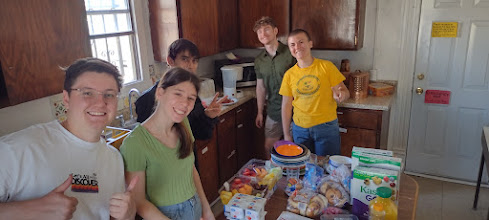
On Sunday we were given a short orientation as to what to expect at the A-House shelters and our forthcoming jobs. Then we were given the rest of the day off to recover from our travels. Whew, we needed that rest. Work began on Sunday.
In contrast, some of the guests we received just this week had very different travel experiences. They did not simply “leave” their homes, friends, and family members, they fled! They fled from Bolivia, and Ecuador, Mexico and Venezuela. Ruben asked us, “Why would a person flee one’s homeland?” He provided the answer: “Fear and Food.” Fear of the local criminal organizations and gangs threatening them with violence, kidnapping their children, and extorting them for money to leave them alone. They also leave because of the poverty they experience and the inability to work and properly feed their children.
The guests who arrived this week came from Ecuador, Venezuela, Bolivia, Mexico, and Guatemala. They arrived here via a combination of flying from their country to another one, e.g. Ecuador to El Salvador, and then boarding a crowded bus to Guatemala. Some must walk through Guatemala; others may take a bus or hire a driver to get to Mexico. Once in Mexico they still have 2,100 miles to travel to get to Juarez which is the sister city to El Paso. Several traveled through the treacherous Darien Gap – dense jungle that connects Colombia and Panama.
Once in Mexico they make their way north, walking, traveling in an open train car packed with dozens of other migrants, and some even in a freight container being pulled by an 18-wheeler truck. By this time, our guests who are traveling with children have little money, food, or water. They are in hot, cramped quarters. One woman told me that it was so hot in the container in which they were placed, that an older person died from the heat. She told me that the entire trip was very scary, especially for her baby with severe medical challenges.
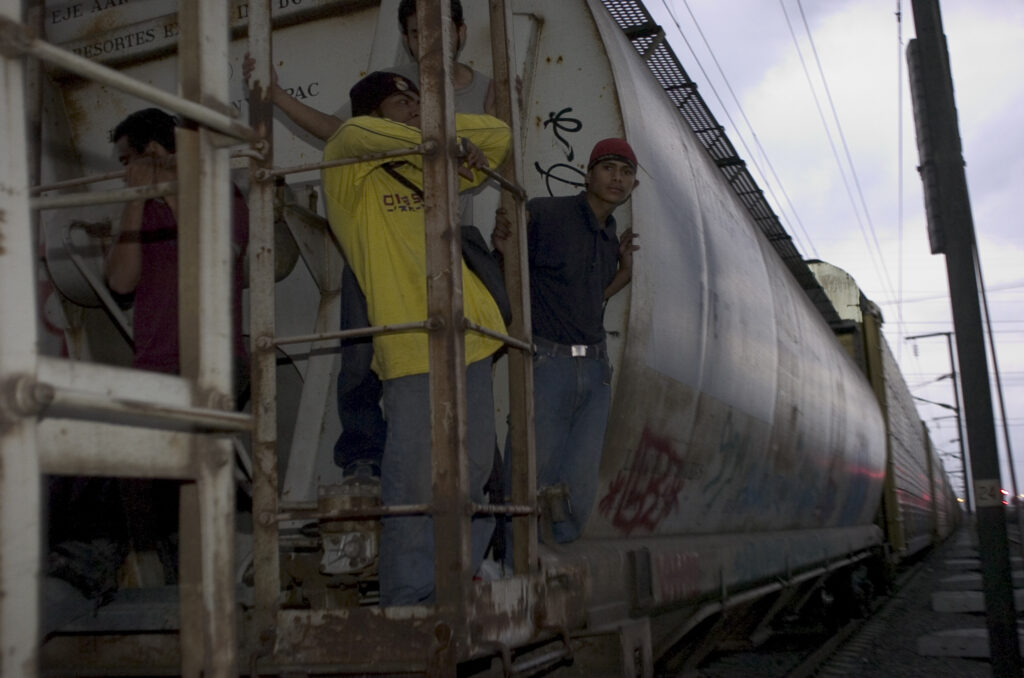
All of our guests reached the US – Mexico border at Ciudad Juarez. Some spent many days at a shelter in Juarez before presenting themselves at the border to US border patrol asking for asylum which is provided for by US law. Officers take the migrants into custody and do an initial interview to determine if they have a valid reason to seek asylum. If they do, they are given paperwork that gives them legal status for being in the United States.
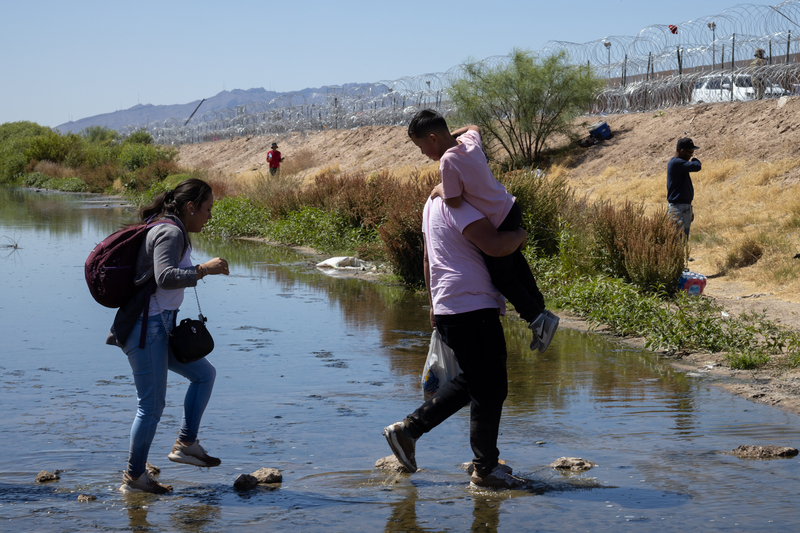
THIS IS IMPORTANT: MIGRANTS WHO HAVE ASKED FOR ASYLUM AND HAVE BEEN GRANTED PERMISSION TO BE IN THE US AND HAVE TO REPORT AT A FUTURE DATE BEFORE AN IMMIGRATION JUDGE TO REVIEW THEIR CLAIM FOR ASYLUM, ARE HERE LEGALLY. THEY ARE NOT “ILLEGAL ALIENS.”
Migrants who need assistance to get wherever they want to go in the US are brought to one of the Annunciation House shelter sites in El Paso by US immigration officers. This is not the end of their journey. Here we welcome them, give them cold water, coffee, and food and assist them in contacting their family members and friends in the States who are expected to purchase a ticket for bus, plane or train to get them to their final destinations. Most guests speak Spanish and very little English. Some speak a little Spanish because their primary language is an indigenous one. If necessary, they are welcome to sleep at the shelter until their travel arrangements are completed.
There are occasions when some migrants were injured in their crossing and need long-term medical care. These people stay at the house in which we are working, Casa Vides.
The guests we have received are all extremely grateful to be welcomed and assisted. The most moving time for us has been when they share their difficult journeys with us, and then when we join hands in prayer to bless them as they leave. Their journey has not ended until they have landed in Oakland, Nashville, Tallahassee, Arlington, etc. and are received into the arms of their loved ones.
Why do Ruben Garcia and the hundreds of volunteers who come here year after year do this work of hospitality? It is simple. They (and we) are guided by the words of Jesus who said that when we feed the hungry, welcome the stranger, clothe the naked, etc. we feed, welcome and clothe Jesus himself. (Matthew 25: 31-46).
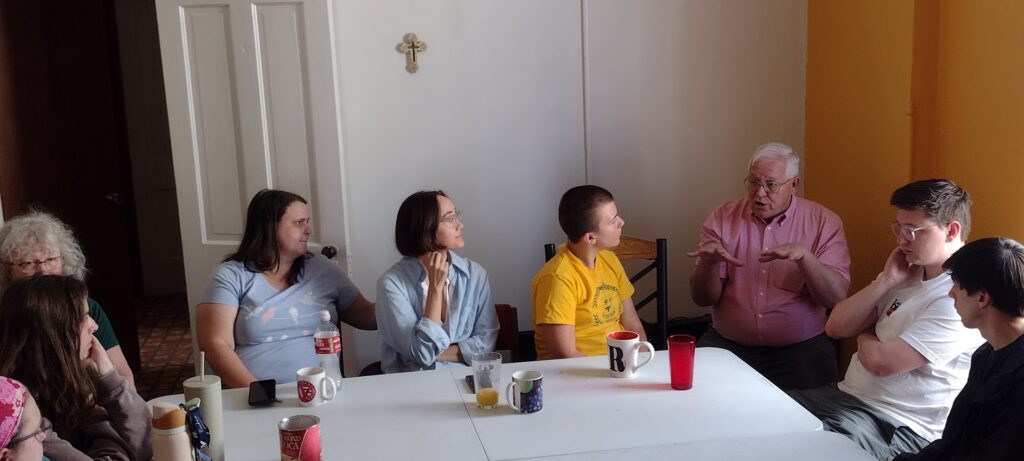
As we reflect on the many journeys that have brought each of us to Casa Vides in El Paso, we’re humbled. There is no comparison, really. We were traveling / journeying as a choice. We had resources: a car, food, money to buy whatever we needed; we knew exactly where we were headed and exactly how much time it would take us. Our migrant sisters and brothers have none of this certainty or security. They set out on a journey in desperation, and they hope they will survive. Our country’s immigration policies need great reform. But meanwhile, we also need those who will welcome the stranger at our door as Jesus commands.